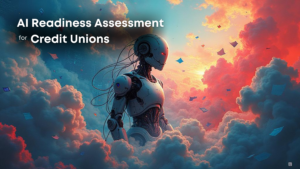By Robert McGarvey
For CU 2.0
Think very – that’s the question’s answer. But maybe you already have in hand the exact weapons you need to defend your position. Surprised?
Read on.
Triggering this discussion is a recent Snarketing post by Cornerstone Advisors’ Ron Shevlin that offered hard data about Amazon’s potential popularity as a consumer bank.
Cornerstone had surveyed 2015 consumers – with both a bank account and a smart phone – and asked two questions: would you bank with Amazon for a free checking account? Would you pay, $5 or $10 monthly, for a premium checking account that bundled in perhaps cell phone damage protection or roadside assistance?
Before guessing the answers – they will surprise you – feast on this recent headline from the Evening Standard newspaper in London: Is data the new oil? How information became the fuel of the future.
That question is deeply intertwined with Amazon’s possible banking play.
Ask yourself: what US company knows an incredible amount about you, probably more than any other? Hint: it’s a company that sells just about everything, much of it delivered free within two days.
Amazon, very quietly, has emerged as a real king of the data mountain. Google may know what interests you, Facebook may know who your friends (and enemies!) are, and Apple knows what tech bling you will splurge on, but Amazon – in many households – knows everything you buy, from groceries to clothes.
In 2017 Amazon tells me I placed 107 orders. Many were for multiple items. From cat food to an Echo Look.
Think how well that data resource positions Amazon to pounce into banking. It knows its many millions of customers, it’s already providing credit cards and purchase credit to millions of them, and CEO Jeff Bezos has never shied away from offering discounts if he believes doing so will produce longterm profits.
Will Bezos take the plunge into the slow moving financial services world? Do we – consumers – want him to?
A free Amazon account just might seem to be a threat to a credit union sweet spot. According to Bankrate.com, 84% of credit union checking accounts have no monthly maintenance fee, up from 72% a couple years earlier. For many credit unions, this is a key marketing difference.
And yet Cornerstone’s research found something interesting. Asked if they wanted a free Amazon checking account, 42% of consumers said nope. Just 26% said they would open it. Another 32% said they would consider it.
Matters get more intriguing when Cornerstone asked if they wanted a premium, bundled account with a small monthly fee of $5 or $10. Only 34% said no thanks – that’s sharply down from the 42% who rejected the free account.
And 29% said they would open it, up from the 26% who said they would open a free account.
Does free carry less weight than you thought?
Is it maybe time to rethink using free as the centerpiece of the institution’s marketing?
Shevlin stressed that, at least superficially, the institutions that would be most impacted by an Amazon entry into banking would be the money center banks, mainly because they are courting millennials who, Cornerstone said, are the ones most attracted to the Amazon potential products.
But Shevlin tossed out this poisoned dart: “The smaller financial institutions are already challenged in attracting younger consumers to their institutions. An Amazon entrance into banking will only make it harder for them.”
And remember this: Amazon may well know your members better than you do.
Frightening? You bet. But there is that solution that already is in your hands. The solution is to fight back by diving ever deeper into member data. The data will tell you your next steps – if you learn to listen to it.
Plenty of credit union focused big data experts are adamant that credit unions can fight back against the Amazons.
Fight data with data.
You have lots of data, from sharedraft accounts, credit and debit cards, maybe car loans and home mortgages. Use the data you have to prepared a battle plan.
You will need it because, whether Amazon takes the plunge into consumer banking or not, other non banks will. They already are circling this pond and they act as though they smell blood in the water.
You have the data. It’s the only weapon you need.
And remember that in the 21st century data is indeed the new oil. Let it power your institutional growth.



